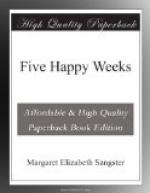“I think, dear,” she said, “that I must have you read a while every morning. Edie has promised to practise an hour a day, and Mabel is going to sit by me and crochet. All work and no play would never do, but all play and no work would make you all wish you had never seen Locust Hall.”
“Now, Aunt Maria, how can you say that! I am sure I should be perfectly happy if I could play with Luce and do nothing else all day long.”
“Well, I’ll let you try it, some day, on this condition: you will promise, as an honorable boy, that no matter how tired you get, you will keep to your part of the bargain.”
Johnnie was about to promise, when Edith called out:
“Better think about it first, Johnnie. I once tried playing a whole day, and it was tiresome enough, I can tell you, before I got through with it. It was dreadful.”
[Illustration]
“If we agree to do it, I’ll keep to my part, Aunt Maria; but as Edith says, I’ll think about it first.” So Johnnie went off to the library, and took down a volume of stories about the Revolutionary war.
CHAPTER III.
Violets and roses.
A few days passed by, and there came a letter from papa saying that mamma was feeling better. This was very delightful to the little girls and Johnnie, though they had had a talk before it came about the duty of being sorrowful under the circumstances. It happened this way: they were outdoors playing May Queen.
“I never saw anything so sweet as these violets,” cried Edith, in a rapture. They were as sweet as they could be, little English violets, white as snow, and perfuming the air. The flowers had come to Virginia early in the new spring, and already there were early roses, slender lilies of the valley, with tiny cups to catch the dewdrops, and the fragrant yellow jasmine flinging its golden bells over every roadside fence and tree. Old Uncle Moses had taken the children to the woods, and there they had seen the jasmine in its glory, and the white stars of the dogwood shining through the green branches far and near.
“’Pears like,” said Uncle Moses, after one of these expeditions, “’pears like God must love posies, de way he scatter dem roun’ dis yer land.”
For all that Miss Josephine had been left at home, the little girls had not been obliged to live without a doll. Kind Aunt Maria had given them each one soon after their arrival. Out in the garden, then, with the dollies, Luce full of enthusiasm, and barking and rolling like an animated puff-ball, or else sitting up as straight as a judge, they were playing queen. Mabel had just fastened the wreath on Edith’s head, when Johnnie very gravely observed,
“I think we are heartless wretches.”
“Johnnie, where do you learn those big words?”
“Well, we’re having such nice times, and never thinking of poor mamma. We ought to be miserable, if we had any feeling. I heard Aunt Chloe the other day say, ’Pore things, dey a’n’t ole ’nuff to know what dey’d lose, if dey done lose dere mudder.’”




